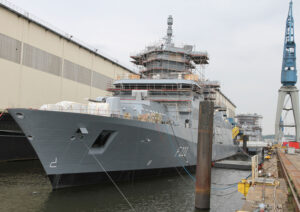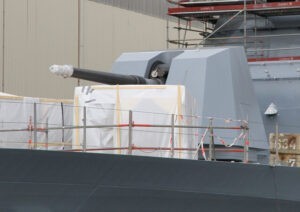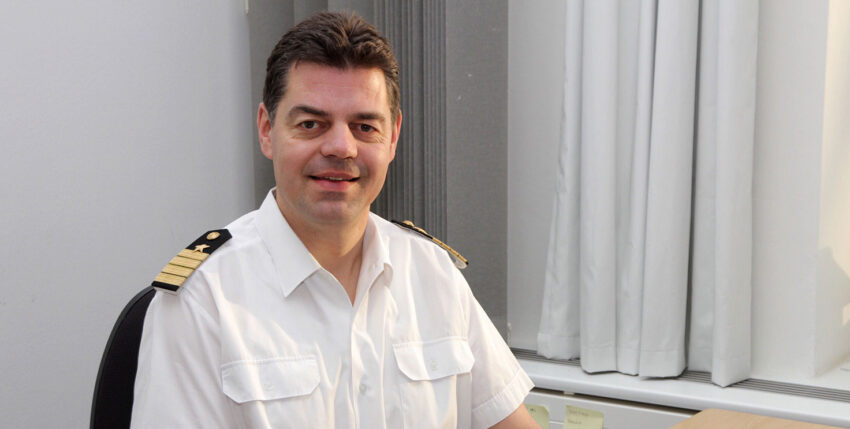Interview with the Special Commissioner Frigate Class 125 Captain at sea Christoph Mecke
Captain Mecke, the construction of the frigate "Baden-Württemberg", the first ship of the new Class 125, is now well advanced. Where do you currently stand in the project plan?
The ship has overcome important hurdles, including the successful trial run of the propulsion system. The shipyard trial voyage of the "Baden-Württemberg" is planned for the spring of this year. This is a decisive milestone that everyone involved is working towards at full speed.
You have been a special representative for the F125 frigate at the naval command since the beginning of 2015 and report directly to the inspector. What are your tasks?
The Frigate 125 is more than just a defence project. The German Navy is breaking new ground in many areas with the operation of the new ships. Be it the multi-crew model on a ship, be it the intensive utilisation, be it the relatively small regular crew with large embarkation elements. This means a lot of planning work, which I coordinate with my small team. In this way, I relieve the burden on those colleagues in the navy whose main task is to support the technical realisation of F125 is.
The frigate 125 is, in the words of the Inspector Navy, the "centre of gravity of the new navy". This signals that it is not just a modernisation programme for the fleet, but that a fundamentally new operational concept is also being introduced. What does this new concept consist of?
Firstly, we consistently separate the platform and crew. This allows us to leave the ship in the operational area for up to two years. Secondly, we are transferring as much of the administration, training and training management as possible from sea to land. Among other things, we need the operational training centre, which is currently at an advanced stage of planning. As a result, the operating hours of the ships and absence times of the crews will be largely focussed on the deployment and on obligations similar to deployment. Overall, we are therefore gaining greater availability Frigates. This is the only way we can manage the balancing act of fewer units and more tasks and at the same time contribute to the attractiveness of the Navy by reducing absences.
At the Wilhelmshaven naval base, construction is underway for the F125 project, among other things. What is this work all about?
Crews that are not deployed or otherwise at sea must be able to carry out their duties effectively ashore. To do this, they need service buildings and, in some cases, accommodation buildings. These are currently being built in the so-called western extension of the 4th entrance.
What does the multi-crew model mean for the personnel management of the ships?
First of all, this is a mental step. We have to get used to thinking in terms of crews and not just units. What's more, the F125 crew is comparatively small for a ship of this size. This means that four or five crew members cannot simply be missing. We don't have this redundancy. All of this generates planning work, which essentially has to be done on land.
Can you be sure that you have enough personnel available for the eight crews planned?
Recruiting specialised personnel is a real challenge for the navy. There are many reasons for this and a comprehensive discussion would certainly go beyond the scope of this interview. Intuitively, of course, the idea of a shortage of personnel is obvious, F125 with fewer than the planned eight crews. But there would be a big catch. With fewer than eight crews, the rotation across the four ships would no longer work completely and the availability of the units in action would be drastically reduced. This would therefore be very inefficient. And there is another important aspect: the multi-crew model reduces the burden of absence. This plays a key role in the decision of young people who are interested in the Bundeswehr to join the navy. The multi-crew model is therefore also a contribution to successful recruitment. That is why I continue to assume eight crews.

In this context, do you consider the reservations, as already expressed in readers' letters in the MarineForum, keyword "crew hotel", regarding the dissolution of conventional crew structures and a possible associated loss of identification to be understandable?
The crew structures remain the same. The difference is the separation of crew and ship. It is always difficult to give up familiar things. However, our boat crews have long since become accustomed to serving on different boats. There is no question that the intensive utilisation of frigates is more complex than that of boats. But in terms of mental acceptance, the challenges are the same. What the boat crews have achieved, the ship crews can certainly do too. Nevertheless, anyone who criticises the multi-crew concept must honestly say what the alternatives are. If Germany wants to continue to make a substantial contribution to maritime operations, some adjustments will have to be made. Either we need significantly more units. This is illusory, even under improved financial conditions. Or crew absences will continue to increase significantly. This is no longer acceptable, as the crews are already under a heavy workload. Then let's do what we did with F125 plans: We are improving the availability of the units on deployment. I believe this is the best solution to ensure that the German Navy can continue to fulfil its obligations.
The availability of the ship for up to two years in the operational area requires particularly reliable and operationally safe equipment and systems and a correspondingly sustainable stock of spare and replacement parts on board. How is this taken into account in the armament process for the new frigates?
The F125 is designed to remain in use for two years. That's what the construction contract says. That's what we expect. And I assume that the industry will deliver a good product in this respect.

The operating philosophy of the Class 125 frigate includes a significant reduction in the number of crew on board. What does this mean for the qualifications and training of the crew?
With the suspension of compulsory military service, the Bundeswehr can no longer fall back on a large pool of crew ranks who carry out simple tasks with a comparatively low level of training. There is therefore no way around reducing the size of on-board crews and automating these simple tasks. The sophisticated technology required for this requires the remaining personnel to be more highly qualified. On the one hand, this is a challenge, as skilled labour is not easy to come by. On the other hand, it is also an attractive feature, as working with modern technology is interesting and fulfilling. For those who only want to stay with us temporarily and have therefore decided in favour of a career as a regular soldier in the navy, it is also an excellent recommendation to future employers. Anyone who has proven that they can handle complex technology responsibly under operational conditions will also be successful in their professional life outside the Bundeswehr.

The reduction in crew size will also involve the transfer of some tasks from on board to ashore, namely with regard to the tracking and management of equipment and its maintenance. How far have the organisational preparations, e.g. those for the planned "shipyard group", progressed? What tasks will the crews actually be relieved of?
Firstly, there will be elements on land that will take over some of the tasks that were previously carried out on board. In addition, the shipyard group will F125 during parts of a shipyard layover so that the crews can concentrate on operations and operational training and also recover after an operation.
Since 1 January 2016, the "Regulation on the Working Hours of Servicemen and Women" has applied to the business area of the BMVg. What impact does this have on the operation of the frigate Kl. 125?
If the multi-crew model didn't already exist, it would have to be invented now. As a result F125 The company is in a position to demonstrate a high degree of flexibility even under the new framework conditions because, for example, one crew can be granted time off in lieu while another continues to sail the ship. Overall, the effects on F125 therefore lower than on existing weapon systems.
How will the construction and commissioning of the new frigates continue and what is your main focus?
We have already talked about the "Baden-Württemberg". The "Nordrhein-Westfalen" is currently being fitted out and commissioned in Hamburg. She will go to sea for the first time next year. The third F125 will be christened in Hamburg in March. The fourth still exists in two halves, the forecastle is in Wolgast and the stern in Hamburg. The two sections will be joined together this year. My main focus is on preparing the ships for operation. To this end, I am in close contact with many areas of the navy. We still have a few months to go, but with the transfer of the "Baden-Württemberg" to Wilhelmshaven in the summer at the latest, the time must and will come when we no longer think things through theoretically, but tackle them practically.
Captain Mecke, thank you very much for the interview.
The questions were asked by Frank Ganseuer.







